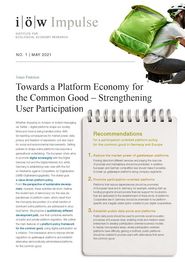Regulating digital platforms: For the common good and for users
From Amazon to Zalando, online platforms are shaping our society. Corona has given a further boost to many digital corporations. Shaping and regulating the platform economy politically is a generational task. Based on current research, the Institute for Ecological Economy Research (IÖW) recommends in its current policy brief "Towards a Platform Economy for the Common Good – Strengthening User Participation" (Download PDF) that Germany and the European Union should focus more on the common good and user participation in platform policy. The market power of a few dominant monopoly-like platforms must be reduced. Democratically constituted platform alternatives should be strengthened so that users can become more independent and participate more. And the public sector should create its own offerings in critical areas as a service of general interest.
"Shopping, short messages, social networks - digital platforms are shaping our society, and more and more is being transacted online. With far-reaching consequences for market power, data protection and freedom of expression," says platform researcher Jonas Pentzien from the IÖW. With the Digital Services Act and the Digital Markets Act, the European Union wants to advance digital sovereignty. Germany, too, is setting new rules against competition restrictions to advance a value-based platform policy.
Policymakers must reduce democratic deficit and user dependencies
"From a sustainable development perspective, however, the policy activities to date fall short," Pentzien said. "Neither the virulent democratic deficit nor the dependencies on the part of platform users resulting from the monopoly-like position of a few dominant platforms are being structurally addressed. To change this, policymakers should focus primarily on the common good and digital participation of users," the platform expert demands.
Platforms should be prohibited from combining data from different services and from assuming a dual role as provider and marketplace, is the recommendation in a current strategy paper from the IÖW. In addition, European and German competition law should open up the option of unbundling platform groups along business lines. In return, platforms that democratically integrate users should be promoted, and the European Union and Germany should support such start-ups by providing funding for startups. To this end, the law on cooperatives must be amended and the possibility of legally secure digital membership in cooperatives created.
Establish public data pools and platforms
Social innovation processes should be promoted with public data pools, on the basis of which small and medium-sized enterprises can develop participation-oriented business models. In areas where participation-oriented platforms have difficulty gaining a foothold, public platforms should be created to open up alternatives for users in the sense of services of general interest.
~~~~~~~~~~~~~~~~~~~~~~~
Download:
About the author:
Jonas Pentzien works at the Institute for Ecological Economy Research (IÖW) on the platform economy in the project "Platform Organizations in the Digital Sharing Economy - Oragnizational Forms, Effects, and Socio-Ecological Transformation Paths" with funding from the German Federal Ministry of Education and Research in the funding program "Socio-Ecological Research". As a fellow at the Institute for the Cooperative Digital Economy at the New School, New York City, USA, he published the report "The Politics of Platform Cooperativism.
Jonas Pentzien
jonas.pentzien(at)ioew.de
Tel.: +49 30 884594-15



